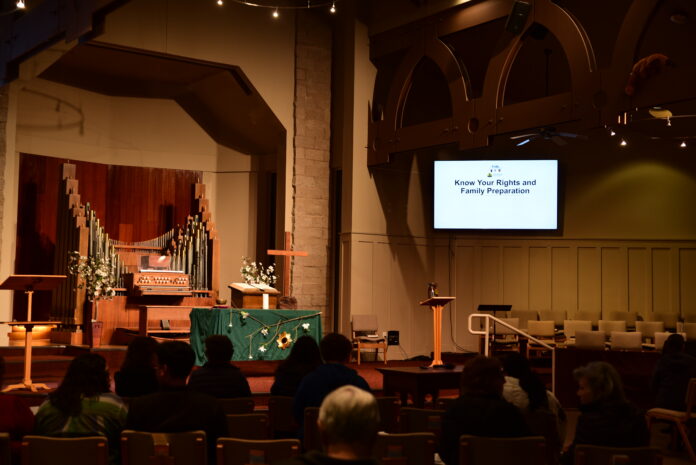The event covered how immigrants could assert their rights in the presence of ICE or the police
By RORY CONLON — city@theaggie.org
The Yolo Interfaith Immigration Network hosted a workshop to help immigrants understand their legal rights when interacting with immigration agents and police at the Davis United Methodist Church on Feb. 19.
If immigrants are stopped out in public by Immigration and Customs Enforcement (ICE) or the police, they have the right to remain silent. Amagda Perez, a co-director of the UC Davis Immigration Law Clinic, said the goal is to avoid giving officers probable cause to arrest.
“The only way that any of us can be arrested or deported is if we provide probable cause to show that we’ve committed a crime or that we’re here without status,” Perez said. “Without answering any questions, we’re not contributing any information that could be used against us.”
Perez said that people do not need to present their documents unless they are pulled over.
“All you have to do is present your driver’s license, your car registration and proof of insurance, because otherwise you get your car taken away,” Perez said. “But after that, you’re not required to give your name [or] answer any questions regarding your nationality, citizenship status or place of birth.”
If ICE agents visit a residence, people can exercise their right to remain silent and choose not to open the door. They can also ask immigration agents to slip the warrant they have under the door or through the mail slip.
Alicia Rusoja, an assistant professor with the School of Education at UC Davis, said people should determine whether ICE agents come with a judicial warrant or an administrative warrant.
“A judicial warrant is one that ICE can use to enter your home — [that’s] the one that’s correct,” Rusoja said. “An administrative warrant is something ICE cannot use to enter your home. Most often, ICE comes with an administrative warrant, so you should become familiar with these and know the difference.”
If ICE tries to enter the home regardless, residents should call the hotline for the Sacramento Rapid Response Network at (916) 382-0256. This line can also be used to report ICE activity in Sacramento or Yolo County and seek help for someone detained in the last 24 hours.
If people are taken into custody, they have the right to remain silent, and they should not sign any document until they have consulted with a lawyer. While everyone has the right to an attorney, the government does not have to grant people one if they are in the middle of immigration proceedings.
Natalia Deeb-Sossa, a professor in Chicano/a Studies at UC Davis, said people should know what public and private spaces are in a workplace and make sure they are well-designated.
“ICE can only have access to public spaces, not private spaces,” Deeb-Sossa said. “In a restaurant, [a public space is where] people who are eating sit, and in the back, where the cooks are, [that is a private space, and] they cannot go in there.”
The discussion turned to how schools are navigating interactions with ICE. Joana Peraza, a lawyer with the California Rural Legal Assistance Foundation, said that while local school districts have to cooperate with ICE, they can make it harder for them to enter schools.
“Right now, if ICE were to show up at a school in Sacramento County, they have a whole protocol where one, ICE has to come in with a valid warrant, and two, they cannot speak to the child,” Peraza said. “They have to go through either the superintendent of the district or some sort of legal counsel from the district.”
Perez said that UC Davis is still working on a policy for interacting with immigration enforcement, but it will likely be similar in structure.
“At the law school itself, they’ve implemented a policy that they’re not going to share any information, and they have a whole group of lawyers there deciding how the policy is going to be implemented,” Perez said. “They have to go speak with the dean, they’re going to consult with the campus council, they have to evaluate warrants to make sure they’re legitimate and then, if there is a court order, they will cooperate and release information.”
Deeb-Sossa said that she would not identify students to ICE, share whether they were in class or present their schedule.
“It’s about who the gatekeeper is,” Deeb-Sossa said. “Tell them: ‘This is a private classroom. You are not registered in my classroom. Get out of my classroom.’”
Written By: Rory Conlon — city@theaggie.org









